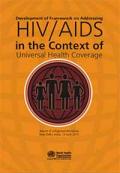Publications - Released in 2016
Universal health coverage (UHC) is an aspirational goal that aims for all people to access and use the promotive, preventive, curative, rehabilitative and palliative health services they need that are of sufficient quality and do not cause financial hardship. HIV programmes have, more than any other health programme, served as a trailblazer for UHC at the global and regional levels. They have been characterized by their strong drive in ensuring equity of access to HIV interventions and by their clear focus on the three dimensions that define UHC: providing health services, covering populations and covering costs.
The global HIV response over the past 15 years has been relatively successful: antiretroviral therapy (ART) has been rapidly scaled up; and new HIV infections and AIDS-related deaths have declined. Still, there were an estimated 2.1 million new HIV infections and 1.5 million AIDS-related deaths in 2013. With business as usual approach, these figures are projected to increase in the future. In the post-2015 sustainable development era, there is a need to strengthen and accelerate the HIV response using the UHC agenda to achieve the end of AIDS by 2030.
Downloads
Organizations
- World Health Organization (WHO)






